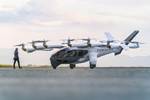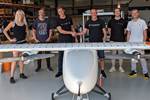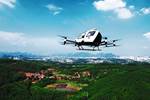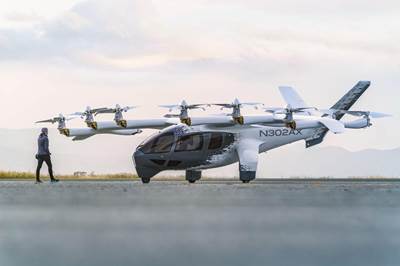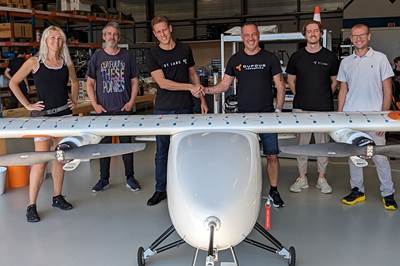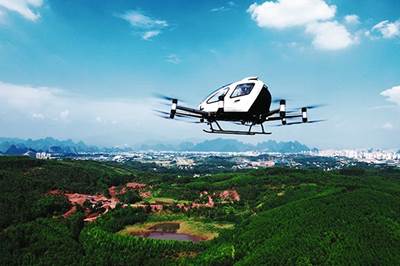Vertical Aerospace VX4 program moves to the next phase
The company’s latest announcement touches on eVTOL flight and program updates, confirming that Vertical is still on track with no changes to the timeline.
Photo Credit: Vertical Aerospace
(London, U.K.) has provide an update on its overall program including a flight test update, addressing the unexpected fault that occurred earlier in August and where the company is at in regard to its program timeline.
Vertical concluded its remote thrustborne flight test campaign in July 2023, as the first full-scale VX4 electic vertical takeoff and landing (eVTOL) aircraft prototype reached its target speed of 70 kilometers per hour, demonstrating exceptional overall stability and control. Performance targets were generally exceeded by 10-30% during hover and low-speed flights. The company says the prototype performed especially well in sustained hover, typically the most challenging regime for a VTOL aircraft, where it maintained level flight for longer than anticipated. The aim of these thrustborne flight tests was to verify acceptable stability, battery efficiency and control characteristics, aerodynamics, structural loads, performance and vibration throughout this speed range — all of which were achieved.
Vertical continued further uncrewed flight tests following the completion of the remote thrustborne flight test campaign. The purpose of these was to understand how the aircraft performed outside of its expected operating conditions before the aircraft’s planned retirement.
During one of these test flights, an unexpected fault occurred causing the aircraft to enter a stable descent, before being damaged on impact with the ground. Vertical completed a swift and thorough investigation and submitted a report to the Air Accidents Investigation Branch (AAIB). The company’s investigation identified the root cause to be a fault with a propeller. This early generation propeller had already been redesigned prior to the incident, with the issue fully resolved ahead of the next phase of testing. Further recommendations by the investigation are being implemented by Vertical.
Vertical believes transparency and openness is fundamental to the safety of aerospace. It therefore intends to provide a further full update to the industry on the incident once the AAIB’s investigation has concluded.
Supported by the learnings from the completed thrustborne campaign, the VX4 and its certification program remains on track with no changes to timelines. The assembly of a second significantly more advanced full-scale VX4 prototype is underway at GKN Aerospace’s Global Technology Centre in Bristol., U.K. This demonstrator is expected to be ready to fly in early 2024. Its components will include technology from most of Vertical’s certification partners: Honeywell, GKN Aerospace, Hanwha, Solvay, Leonardo and Molicel. An additional, identical full-scale aircraft has also now been approved and is expected to be flying in the second half of 2024.
These upgraded full-scale aircrafts’ structures and subsystems will be tested in line with certification standards. Both will require rigorous regulatory oversight, including a Permit to Fly from the UK Civil Aviation Authority, to progress to piloted flying.
“We are pleased with our flight test progress to date and the data, insights and invaluable learnings we have collected,” Stephen Fitzpatrick, Vertical founder and CEO, says. “While a fault of any sort is disappointing, it is not wholly unexpected at this stage of testing a novel aircraft. I am pleased that as a result of our expert team we have isolated the cause of the fault and been able to provide the AAIB with our report within 14 days of the incident. Our planned second upgraded prototype, which will include most of our top Tier partners’ technology, will have us in the air early next year and we remain on track for our certification timelines.”
Related Content
Aerospace prepregs with braided reinforcement demonstrate improved production rates, cost
A recent time study compares the layup of a wing spar using prepreg with A&P’s TX-45 continuous braided reinforcement versus traditional twill woven prepreg.
Read MoreJoby conducts FAA testing, moves into final certification
Successful static loading testing of tail structure and Type Inspection Authorization by FAA pilots moves Joby closer to its 2025 targets.
Read MoreUpdate: THOR project for industrialized, recyclable thermoplastic composite tanks for hydrogen storage
A look into the tape/liner materials, LATW/recycling processes, design software and new equipment toward commercialization of Type 4.5 tanks.
Read MoreECOHYDRO project to enable recyclable composites for hydrogen storage
With the involvement of two schools from the Institut Mines-Télécom, the 4-year project aims to improve the intrinsic properties of a composite material based on Elium via four concrete demonstrators.
Read MoreRead Next
Archer developments accelerate Midnight eVTOL path to market
In tandem with Q2 2023 financial and operation results, Archer secures a $215 million investment, Midnight receives special airworthiness certification and an agreement is reached with Boeing and Wisk for autonomous flight collaboration.
Read More9T Labs selected to supply composite connectors to Dufour eVTOL
Structural thermoplastic composite connectors will further lightweight the Aero2 tilt-wing aircraft.
Read MoreEHang completes eVTOL flight testing, preps for type certification
Since its application acceptance in 2021, the EH216-S has met all CAAC safety standards and airworthiness requirements to achieve type certification, and the end goal of commercial operation.
Read More
